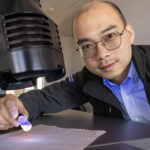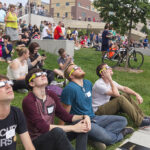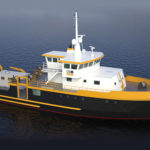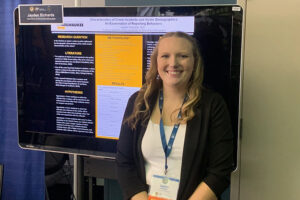
One good way to learn science, technology, engineering and mathematics (STEM subjects) is through hands-on experience.
That’s how 39 students in the WiscAMP program spent their summer, working with local companies and University of Wisconsin-Milwaukee researchers. Many are continuing into the program this fall, according to John L. Baker Jr., WiscAMP coordinator. The program has 50 students total this year, a 33 percent increase over last year.
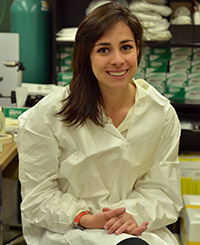
WiscAMP stands for the Wisconsin Alliance for Minority Participation (WiscAMP), a program that helps prepare students for the STEM areas by getting them involved in undergraduate research and internships locally and nationally. The undergraduate research part of the program is funded through the National Science Foundation, and students are paired with and meet regularly with mentors. The program also provides tutoring, if needed, and stipends for the summer so students don’t have to try to hold down a job while doing internships or research.
“The structure of the program is good and gives the students a sense of connection with the university,” says Baker.
The program is designed to encourage students from groups underrepresented in the STEM disciplines to get involved in internships and research that will help them continue in these fields, says Baker. His office reaches out to recruit students through Facebook, Twitter and ListServs in the STEM areas.
Frogs, microfluidics, focus
This summer, students were able to work with partners like Robert W. Baird & Co., S.C. Johnson and the Bradley Corporation to get insights into how academic subjects and research fit into the world of work. Others joined UWM researchers in their labs, doing research on everything from frogs to mircofluidics.
Jason Martinez, a senior majoring in actuarial science, joined the WiscAMP program in 2012. Over the summer he worked with Professor Kyle Swanson of mathematics on a project looking at data on mathematics courses taken by high school students to determine factors that led to new students struggling in introductory college-level mathematics courses.
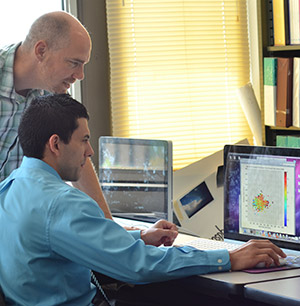
“My summer experience has been most interesting because I am doing some hands on research for the first time with data that has a significant meaning to the school and the students that attend this school, as well as the future of this school and its future students,” Martinez said.
Diamond Lewis, a senior majoring in computer engineering, did an internship with S.C. Johnson as a software developer in sales/marketing support. He found the experience working in a major private Fortune 100 company interesting, though he’s not sure of his future career path. “The summer position introduced me to new technologies and business intelligence from sales. I started out as a business major, and sales may be a possible career path.”
“I would never have known I would enjoy microfluidics so much,” says Maria Alejandra Najera, who worked with Assistant Professor Woo-jin Chang of the mechanical engineering department. “I love learning new things,” adds Najera, a junior industrial engineering major who mixed fluids in microchips.
Experience in the boardroom and the lab
Ashley Holland, a junior in the Lubar School of Business Information Technology Management BBA program, interned at Robert W. Baird over the summer. “The experience has allowed me to dive into real work I will see in the future and helped me figure out which side of IT I enjoy working with the most.”
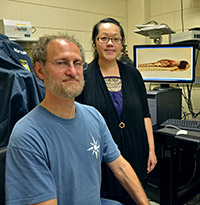
“I have always known what I wanted to do when I grew up, and that was to become a veterinarian, a decision that I have never doubted nor changed,” says Juan Orjuela, originally from Bogota, Colombia. This UWM sophomore worked in the lab of Biosciences Assistant Professor Gerlinde Hoebel, studying the reactions of male and female frogs to certain calls and vibrations, and how these affect the way frogs mate. “The most interesting part of my research internship was when we would go out for our field days. We drove to the UWM field station up north late in the night, put on our waders and headlamps, and penetrated the ponds in search of frog pairs to catch and later test in the lab.”
Sheela Yang, a senior biology major, worked with Senior Scientist Daniel Weber at the Great Lakes Water Institute in the Children’s Environmental Health Sciences Core Center, studying the impact of lead and higher water temperatures on the development of abnormalities in zebra fish. “This experience has taught me how to work in a lab setting by giving me hands-on experience.”
Daniel Monge, who is a tutor in the program, is a senior physics major who has worked with the McNair scholars and other summer research programs. “WiscAMP is not the only research program I’ve participated in, but it’s been one of the most fulfilling,” he says. This summer he worked with Physics Professor Emeritus John Friedman investigating unstable, rotating neutron stars. “Being able to develop models of stars has been very rewarding and allowed me to not only develop my computer programming skills, but has also given me tangible results. In addition, I am hoping to attend graduate school and this has provided me much-needed research experience to be accepted into a great physics program.”

